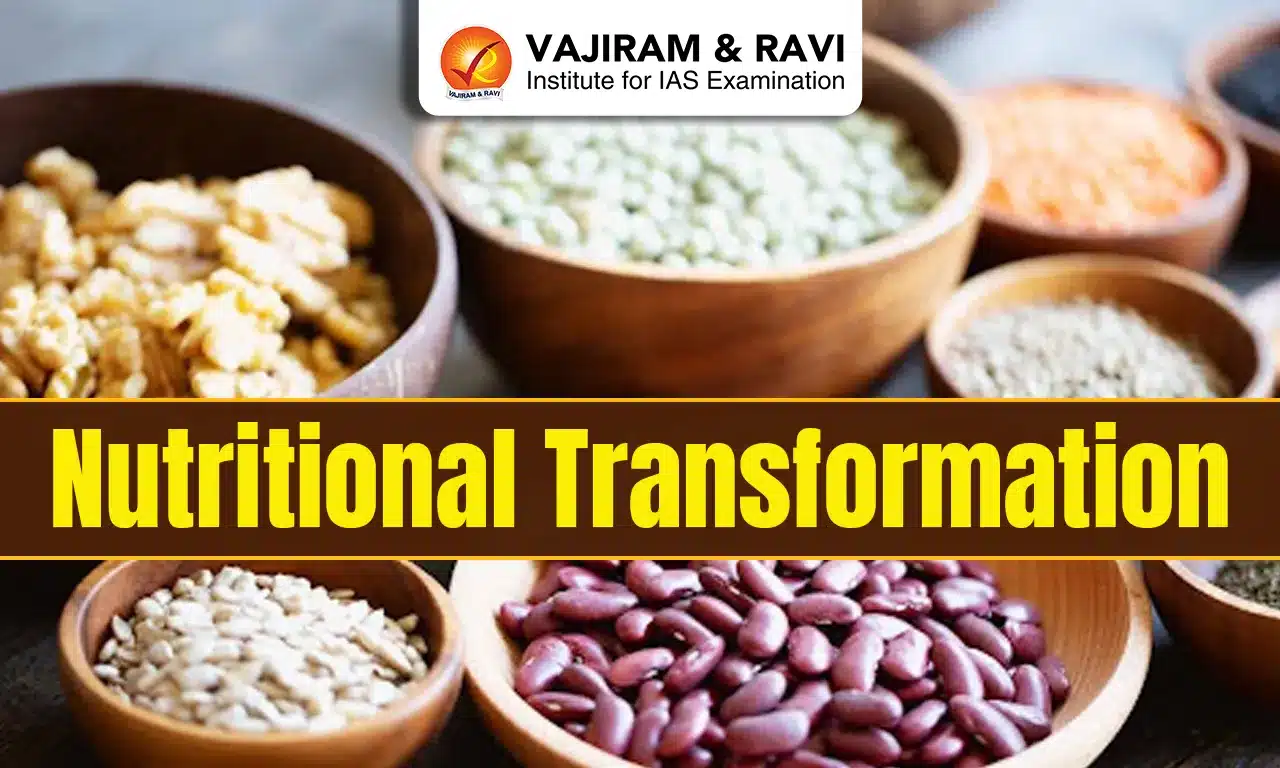India’s nutritional transformation through functional foods and smart proteins can bridge health gaps.
Nutritional Transformation Latest News
India is focusing on nutritional transformation by promoting functional foods and smart proteins to tackle malnutrition and build sustainable, protein-rich food systems.
Understanding Functional Foods and Smart Proteins
Functional foods are those enriched with nutrients to promote health or prevent disease.
Examples include vitamin-enriched rice, iron-fortified pearl millet, and omega-3-fortified milk.
These foods are developed using cutting-edge technologies such as nutrigenomics, bio-fortification, bioprocessing, and 3D food printing.
Their purpose is to enhance the nutritional value of foods already part of daily diets.
On the other hand, smart proteins represent a transformative shift in how proteins are sourced and produced.
They are developed through biotechnology to reduce dependence on conventional livestock-based production. Smart proteins can be:
Plant-based proteins, derived from legumes and cereals to mimic meat and dairy.
Fermentation-derived proteins, produced using microbial systems.
Cultivated meat, grown directly from animal cells in bioreactors without slaughter.
These innovations aim to create sustainable, ethical, and climate-resilient protein alternatives while meeting rising consumer demand for healthier and environmentally responsible food options.
The Need for Nutritional Transformation in India
India’s nutritional imbalance is stark. Despite being one of the world’s largest food producers, over one-third of Indian children remain stunted, and micronutrient deficiencies are widespread.
While caloric intake has improved, protein deficiency remains a major concern, particularly in rural areas.
As India’s middle class expands and food habits evolve, people increasingly seek food that is not only filling but also nourishing.
This demands a transition from the current focus on calorie sufficiency to nutrient sufficiency.
Moreover, this transformation is essential to ensure that India’s food production systems remain sustainable and climate-conscious.
Traditional livestock farming contributes heavily to greenhouse gas emissions, land degradation, and water stress.
Functional foods and smart proteins, therefore, provide a scalable, sustainable, and health-oriented solution to India’s dual challenge of malnutrition and environmental sustainability.
India’s Progress in Functional and Smart Food Innovation
India’s biotechnology ecosystem is gradually aligning with this vision. Under the Biotechnology for Economy, Environment, and Employment (BioE3) Policy, the government has recognised functional foods and smart proteins as strategic innovation areas.
The Department of Biotechnology (DBT) and its public-sector partner Biotechnology Industry Research Assistance Council (BIRAC) have launched several funding programmes to support R&D in these domains.
Research centres like the Indian Institute of Rice Research (IIRR) have developed zinc-enriched rice, while ICRISAT has pioneered iron-rich pearl millet.
Private corporations such as Tata Consumer Products, ITC, and Marico are investing in fortified foods and health-oriented product lines.
The smart protein ecosystem is also expanding rapidly. As of 2023, India had more than 70 startups offering over 370 alternative protein products, including plant-based meat, eggs, and dairy substitutes.
However, challenges remain.
India lacks a clear regulatory framework for novel foods such as cultivated meat and precision-fermented proteins.
The Food Safety and Standards Authority of India (FSSAI) has yet to establish definitive guidelines for safety evaluation, labelling, and certification.
Additionally, large-scale fermentation and biomanufacturing infrastructure remain underdeveloped.
Global Developments and India’s Opportunity
Globally, countries are racing ahead in this new food frontier. Japan pioneered functional foods regulation in the 1980s, while Singapore became the first country to approve cultivated chicken for commercial sale in 2020.
China has integrated alternative proteins into its national food-security strategy, and the European Union promotes sustainable protein production under its “Farm to Fork” initiative.
India, with its strong agricultural foundation, biotech capabilities, and large domestic market, is well-positioned to become a major global supplier of functional and smart protein products.
The global market for plant-based foods is projected to reach $85-$240 billion by 2030, creating opportunities for job creation, rural development, and export growth.
Way Forward
To harness the potential of functional foods and smart proteins, India needs a cohesive national framework that integrates food innovation with public health and sustainability goals. Key steps include:
Developing regulatory clarity under FSSAI for safety, labelling, and certification of novel foods.
Enhancing public-private partnerships to build fermentation and biomanufacturing infrastructure.
Supporting farmer inclusion and skill development to connect traditional agriculture with biotechnology-driven food systems.
Promoting consumer awareness to overcome scepticism around “lab-made” foods through transparent communication and education.
If executed effectively, India can achieve a nutritional revolution, one that ensures food is healthy, sustainable, and accessible to all.
Source: TH
Nutritional Transformation FAQs
Q1. What are functional foods?+
Q2. What are smart proteins?+
Q3. Why does India need nutritional transformation?+
Q4. Which country approved cultivated meat first?+
Q5. What challenges does India face in promoting functional foods?+
Tags: mains articles nutritional transformation upsc current affairs upsc mains current affairs
Previous Article
Kuki-Zo Groups Renew Demand for Union Territory StatusNext Article
India Pulls Out of Ayni Airbase in Tajikistan: Strategic Impact Explained
Vajiram Mains Team
At Vajiram & Ravi, our team includes subject experts who have appeared for the UPSC Mains and the Interview stage. With their deep understanding of the exam, they create content that is clear, to the point, reliable, and helpful for aspirants.Their aim is to make even difficult topics easy to understand and directly useful for your UPSC preparation—whether it’s for Current Affairs, General Studies, or Optional subjects. Every note, article, or test is designed to save your time and boost your performance.
Related Posts
Courses
UPSC Sureshot Mains Test Series
₹25000


